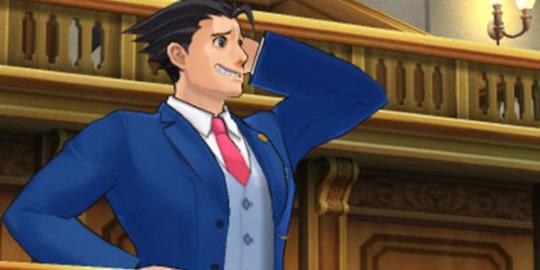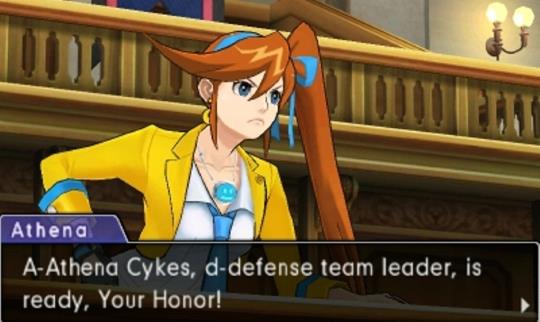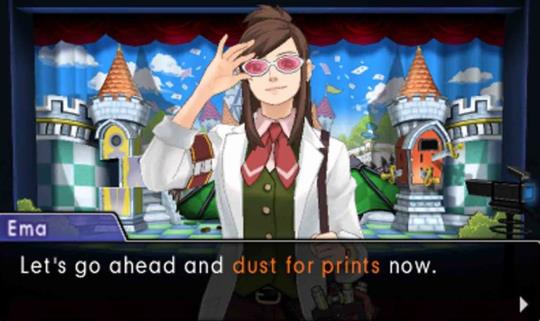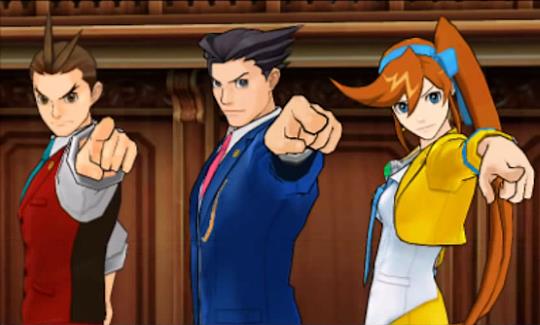Phoenix Wright: The 3DS Games

During the 80’s and 90’s, my perception of Capcom was as a sequel-generating machine. As long as their game was a success you would be guaranteed to see another one… or two… or perhaps even five.
The Mega Man franchise is perhaps the most notorious. Near-annual releases of not only the original game, but the spin-off X series that premiered on the Super Nintendo and continued on the PlayStation. Once the GameBoy Advance rolled around, Mega Man Battle Network reared its head and spawned yet another series on this new device. Street Fighter may have had few “sequels”, but it continued to iterate with updated editions and various cross-over spin-offs. Street Fighter begot X-Men vs. Street Fighter, which begot Marvel vs. Capcom. The Resident Evil franchise seemed to be shambling about much like its iconic creatures before the seventh numbered game released to critical acclaim earlier this year.
The Ace Attorney series – known in America as Phoenix Wright – is at first blush no different than that 90’s style of iterative sequel generation. The second game is much like the original, but with a single new mechanic added. The third game followed suit, adding only a single new feature. Even when protagonists swapped in Apollo Justice, it seemed to be following a similar formula but with one exception.
For other games, swapping protagonists doesn’t exactly mean much. While X is, narratively, a very different character from Mega Man, his traits are defined by his evolution in gameplay. When Apollo Justice makes use of his bracelet to perceive minor physical “tells” during a testimony, it’s no different than the prior games adding new methods of investigating a scene. It’s simply that title’s new gimmick.

However, the narrative emphasis within the Ace Attorney series – where the story and gameplay are intertwined – means the sudden change in protagonists is, itself, a bit more of a bold move. The titular Phoenix Wright is an affable lawyer whose responses reflect that of the audience. When the Judge seems to be a bit of a dim bulb buying into everything the prosecution is feeding him, Phoenix develops an exasperated expression that reflects that of the player. We are emotionally inserted into the game by being empathically linked with our hero. He smiles when we smile, and he is shocked when we are shocked.
Apollo Justice: Ace Attorney takes that relatable protagonist away and instead replaces him with a very similar hero, but one that is still all new to us. Instead, the narrative is now five years since the last game and our previous protagonist has been disbarred. All of our previous side characters that we’d gotten to know have vanished, save for one Ema Skye and the Judge. No sign of Detective Gumshoe, Miles Edgeworth, or Maya.
In some ways this serves as a “reset” for a new generation of players. While the Phoenix Wright series premiered in America in 2005 for Nintendo DS, it was originally first published in Japan in 2001 for the GameBoy Advance. In other words, towards the tail-end of Capcom’s lucrative multi-generation era as a games publisher. Apollo Justice released in 2007 and was the first entry for the dual-screen system in the franchise. Players that did not have a GameBoy Advance weren’t guaranteed to know all of Phoenix’s history. By changing the characters, you allow everyone to jump in with a clean slate while returning players are going to be rewarded by a mystery involving the prior protagonist.
This would pave the way for the 3DS games, both of which continue to move the narrative of the franchise forward. On a technical level, Capcom needed to recreate the game’s engine. While they didn’t necessarily need to, Dual Destinies and Spirit of Justice both use 3D character models and even scenery rather than the drawn assets of the prior games. Even though Apollo Justice saw an improvement in art thanks to the Nintendo DS’ improved resolution over the GameBoy Advance, the engine was still largely the same as the prior games.

Rebuilding the engine thus led to a bit of a stripping down in terms of gameplay. A number of prior mechanics are now gone, and even scene investigation has become simplified. You can only investigate environments designated to be relevant to the case on hand. This helps simplify Dual Destinies into perhaps being the most accessible entry-point for the series. But what of the narrative?
Well, that’s the odd thing. Dual Destinies establishes a sort of status quo for the characters. They all work at the same law-slash-talent agency. Phoenix is the boss with Apollo acting as protegé, Athena as the new hire, and Tracy as… I guess the money maker? It sets a new standard from which we can expect the games to progress from here on out.
To me, the greatest shift is in certain game mechanics being tied to certain characters. The Japanese moniker of Ace Attorney is so much more appropriate, because the games go from being about Phoenix Wright to being about an ensemble cast of playable characters. Phoenix, Apollo, and Athena can all detect when someone is lying or hiding something, but the manner in which they uncover the truth greatly differs from character to character. Phoenix relies on the magatama gifted to him by Maya to know when someone is lying, but he must use evidence to confront the deceiver. Apollo must use his perception to note even the smallest of quirks or tells in someone’s behavior. Athena examines the person’s emotional state to find inconsistencies between their testimony and their feelings regarding their recollections.
Each of these methods somehow ties into who that character is, and if that character is not present for a trial, then that power will not be used for that episode. Contrast to prior Phoenix Wright games that began to feel a bit bloated, making use of every new gameplay mechanic in order to make sure everything got used.
This design continued in Spirit of Justice. While there was a new mechanic added, not every trial took place in the new country of Khu’rain where the mechanic was available. This prevented the game from experiencing frequent feature bloat and allowed diversity between the separate trials.
What Apollo Justice catalyzed and the 3DS titles capitalized on was the benefit of characters. The stories in Dual Destinies and Spirit of Justice are far grander and more emotionally involved because there is a greater cast with which to explore these narratives.
Perhaps more importantly is that synchronized empathy. Just as players grew close to Phoenix Wright through shared reactions to the situation, the player now gets to empathize with surrogates Apollo and Athena. While each character certainly has their own traits and quirks, responding to twists and challenges in the courtroom in unique ways, the broad strokes of surprise, exhaustion, and even anger still manage to reflect that of the player.
To me, Dual Destinies and Spirit of Justice are, without a doubt, the best the series has ever offered. By having to reset the mechanics, it allowed Capcom to revise how they implemented gameplay features. By tying each one to a character, it allows them to further fuse gameplay and narrative together, while using a character’s potential absence as a reason not to overload a trial or case with too many perceived gimmicks. This diverse cast then allows for a series of voices and series of arcs to only add more depth to the narrative.

Which is what really sets the Ace Attorney series apart from Capcom’s other franchises. Every Mega Man game, be it original or X, had to begin without any powers so that the player can collect new ones. Each game relied on the formula of eight robot masters that must be defeated before facing the several stages of the master’s lair – where the player would have to fight each robot master a second time. While small new features were added with every iteration, each game must – in some fashion – be the same.
While the general elements of Spirit of Justice’s gameplay is built on the foundations of the original Phoenix Wright: Ace Attorney, its characters are in a fundamentally different place than they began on the GameBoy Advance. With mechanics linked to each character, this means we cannot rely on the next game having the exact same elements as before.
By allowing the characters to drive the games, the Ace Attorney series invites itself to change and evolve over time. That is why it continues to be – six games in – one of my favorite gaming franchises of all time.


